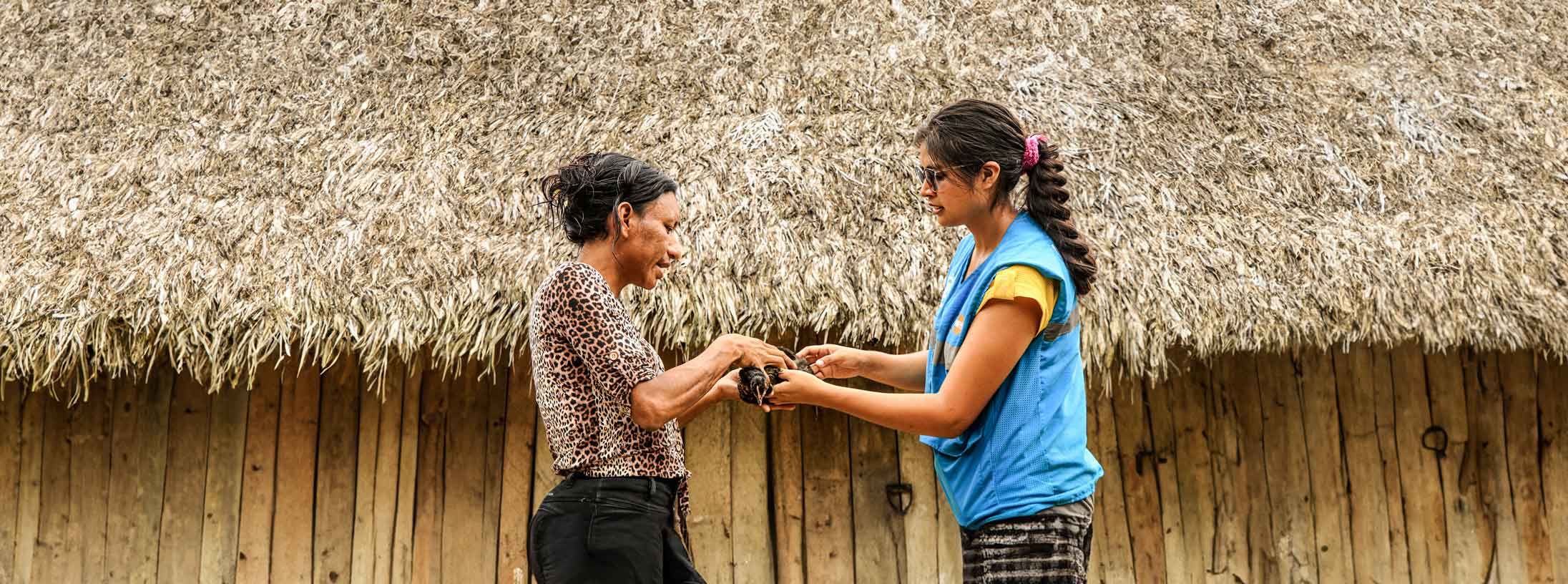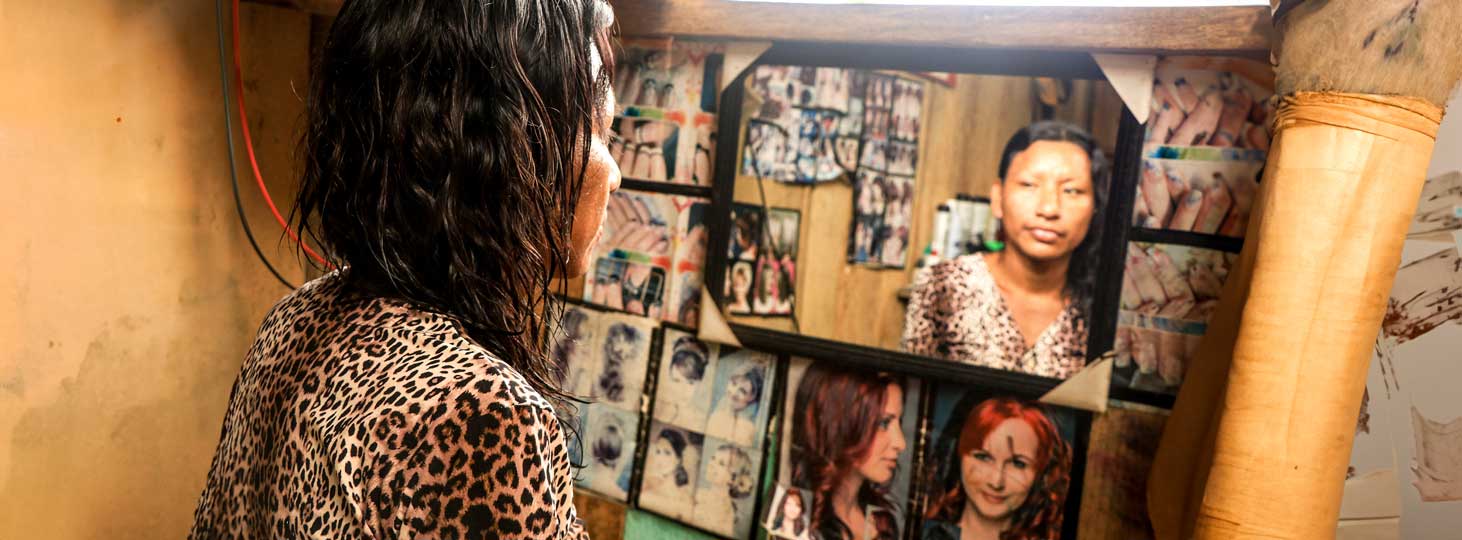Gaby: A Beacon of Resilience in the Heart of Amazonas
In the remote town of Mamayaque, Peru, the story of Gaby, a trans woman, reveals the daily struggle for acceptance and human rights in a community marked by discrimination and hope.
AMAZONAS, Perú –The Amazon rainforest wakes up to the song of birds and the murmur of the river, a constant backdrop in Gaby's life. In Mamayaque, a small town in the heart of Amazonas, she starts her day early, not just with daily chores but with a determination and a dream that have defined her life: cosmetology. Her passion is revealed in her wooden home, among the posters of hairstyles and bottles of beauty products. "As a child, I always liked cutting hair," she recalls with a smile, evoking the days when she watched her friends work in nearby communities and dreamed of becoming a stylist. But Gaby didn't just dream; she acted. Determined to pursue her passion, she left Mamayaque and moved to Lima to study cosmetology, a bold move for a young trans woman from a remote community.

A Brave Journey
Lima was a challenge. With its hustle and frenetic pace, the city contrasted sharply with the tranquility of the jungle. "For me, as a trans woman, it wasn't easy. I had to endure insults and mistreatment just for being different," Gaby confesses. However, her determination did not waver. She completed her studies and worked in various cities, from Lima to Santa María de Nieva, facing each obstacle with the same resilience that had brought her this far.
Return to Mamayaque
After years of working, Gaby returned to her hometown. There, she found something she had been seeking: acceptance and support. "I have many friends," she comments, highlighting the importance of a support network in her life. In Mamayaque, her talent and perseverance not only made her stand out but also turned her into a role model.
The Impact of Nuwa Senchi
The Nuwa Senchi project has had a positive impact on Gaby's life. This program, designed to empower women and promote human rights, became a turning point for her. Through Nuwa Senchi, Gaby learned about her rights and became an advocate for other women in her community. "The intervention of the brigadiers has been very important. Now I ignore the insults; the people who truly know me understand how important I am to them and the community," she asserts proudly.
The project's reach is significant: more than 13,000 people have been reached with messages against violence towards women, 724 women who suffered violence received assistance, and 392 participated in psychosocial support sessions in Condorcanqui, a province where 81.7% of the population is indigenous Awajún and the poverty rate reaches 62.9%. In these conditions, support and advocacy programs are essential.

Context of the Trans Community in Condorcanqui
The situation of the trans community in Condorcanqui is difficult. Since 2022, in Huampami, the capital of the El Cenepa district, the district with the highest population density in Condorcanqui, trans people have not been allowed to enter, arguing that their behaviors are not in line with community norms. They threatened to punish them with shanguina, a stinging nettle plant, and to imprison them. Before this statement, some trans women lived and worked in Huampami, but that is no longer the case. In Mamayaque, while there is some tolerance towards the LGBTIQ+ community, real acceptance is limited, and discrimination persists within families.
In Santa María de Nieva, the capital of Condorcanqui, and in Juan Velasco Alvarado, trans groups made up of individuals from native communities have been expelled or have self-exiled to avoid discrimination and aggression. There, they have slowly begun to integrate into the community, working in beauty salons and participating in sports and recreational activities, although they still face comments and mockery.
Advocacy and Empowerment
Today, Gaby dedicates her time to educating others about the importance of respect and equality. She actively invites women from her community to participate in workshops and activities organized by UNFPA brigadiers. "It makes me happy to share what I have learned; it makes me happy," Gaby comments, her joy palpable as she talks about her role in the community.
Despite the progress, Gaby acknowledges the ongoing challenges. "Some people still marginalize us, don't see us well, or treat us badly," she says. But she doesn't stop. She dreams of working abroad, continuing to grow and learn. Her story is not just a personal journey but a reflection of the broader struggles faced by the LGBTQ+ community in Peru. The community suffers significant discrimination, with 71% experiencing some form of it. Shockingly, 40% of Peruvians report that they would not hire a trans person. These normalized actions deny the full realization of human rights, particularly sexual and reproductive rights.
Gaby Looking in the Mirror, Symbolizing Acceptance and Pride
The work of the Nuwa Senchi project, supported by six brigadiers in the territory, is crucial. Their efforts include disseminating life-saving information, case management, psychosocial support, and strengthening local capacities. These interventions are essential in a province like Condorcanqui, where the need for support and protection is profound.

Inspiration and Hope
Gaby's story is a powerful testament to community support and education's resilience and transformative power. Her journey inspires us to continue advocating for the rights and dignity of the LGBTQ+ community. As UNFPA continues its work, stories like Gaby's remind us of the importance of standing together to promote equality and human rights for all.
About Nuwa Senchi Project
Funded by USAID, this project seeks to empower Amazonian indigenous women by ensuring their access to essential services and protection against gender-based violence. Through a survivor-centered approach, the project aims to prevent violence through effective communication campaigns, and strengthens inter-institutional collaboration, as well as sensitization of state and community authorities.


